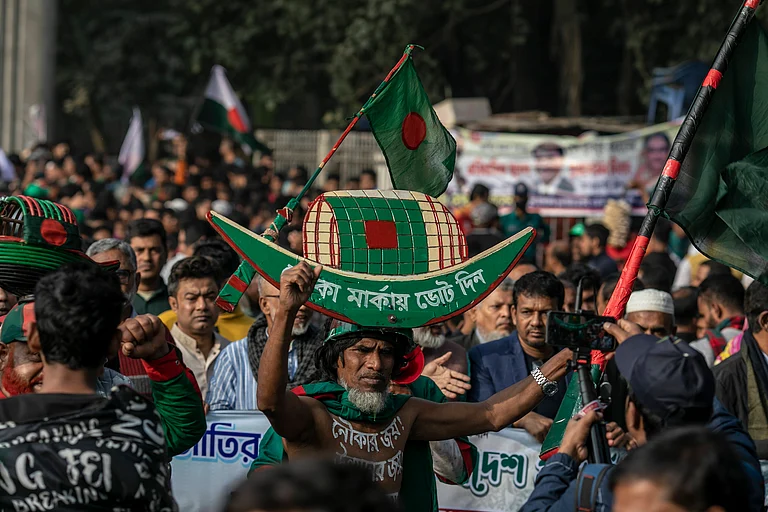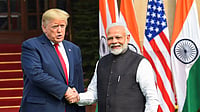Japanese Prime Minister Fumio Kishida on Saturday said the Russian invasion of Ukraine is a "very serious" matter that has "shaken" the roots of international order and asserted that attempts to alter the status quo by using force in any region should never be tolerated.
An India-Japan joint statement, issued after talks between Kishida and Prime Minister Narendra Modi, said the two leaders expressed serious concern over the conflict and the unfolding humanitarian crisis in Ukraine and pitched for an immediate end to violence and resolution of the situation through dialogue and diplomacy.
The joint statement said the two leaders affirmed that they would take "appropriate steps to address the humanitarian crisis in Ukraine".
Addressing a joint media briefing with Modi after the 14th India-Japan Summit here, Kishida said he has told the Indian leader that one-sided efforts to change the status quo by force can't be allowed in any sphere and the Ukraine matter has to be approached with a "strong resolve".
In his remarks at the briefing, Modi did not make any direct reference to Russia's invasion of Ukraine but referred to geopolitical events which were presenting new challenges.
At a late-night media briefing, Japan's Press Secretary Hikariko Ono said there was a lengthy discussion on the Russian invasion at the talks and the Japanese prime minister reiterated his "serious condemnation" of Moscow's action and described it as "outrageous".
"Kishida hails from Hiroshima that was hit by a nuclear bomb. He said that any nuclear threat, leave alone its use, cannot be tolerated," Hikariko said.
She said Kishida asked Modi to impress upon Putin in order to maintain free and open international order.
Hikariko said Kishida and Modi agreed on four points that included not accepting any attempt to change the status quo by force anywhere in the world and seeking peaceful resolution of the conflict.
Hikariko said they agreed to call for an immediate cessation of violence to "break the deadlock", and support Ukraine and its neighbouring countries.
Asked about India buying discounted crude oil from Russia, the spokesperson said: "We are aware of the reports. At the summit, Kishida stated Japan's position that the international community should take resolute action in a united manner (to deal with the Ukraine crisis)."
On China's growing assertiveness, the Japanese press secretary said Modi and Kishida agreed to strongly oppose any attempts to unilaterally change the status quo by force in the east and south China seas.
The joint statement said Modi and Kishida pitched for resolution of the conflict through dialogue besides underscoring the importance of safety and security of nuclear facilities in that country.
It said the two leaders expressed serious concern over the conflict and assessed its broader implications, particularly to the Indo-Pacific region, as well as the unfolding humanitarian crisis in Ukraine.
"We discussed the situation in Ukraine. The Russian attack on Ukraine is a very serious matter that has shaken the roots of the international system. We need to approach the matter with a strong resolve," Kishida said at the media briefing.
"I told Modi that one-sided efforts to change status quo by force can't be allowed in any sector. We both agreed on the need for a peaceful solution to all conflicts on the basis of international law," he added.
The joint statement said Modi and Kishida reiterated their call for an "immediate cessation of violence and noted that there was no other choice but the path of dialogue and diplomacy for resolution of the conflict."
While Japan has been severely critical of Russia for its invasion of Ukraine, India has been pitching for resolution of the conflict through dialogue and diplomacy.
"The prime ministers expressed their serious concern about the ongoing conflict and humanitarian crisis in Ukraine and assessed its broader implications, particularly to the Indo-Pacific region," the joint statement said.
"They emphasised that the contemporary global order has been built on the UN Charter, international law and respect for sovereignty and territorial integrity of states," it said.
It said the leaders underscored the importance of the safety and security of nuclear facilities in Ukraine and acknowledged active efforts of the International Atomic Energy Agency (IAEA) towards it.
Modi and Kishida highlighted their commitment to working in tandem towards a peaceful, stable and prosperous world based on a rules-based order that respects the sovereignty and territorial integrity of nations.
They also emphasised the need for all countries to seek peaceful resolution of disputes in accordance with international law without resorting to threat or use of force or any attempt to unilaterally change the status quo.
"In this regard, they reaffirmed their common vision for a free and open Indo-Pacific, free from coercion," the joint statement said.
"They shared the view that the economies of both countries in such a world would be powered by robust bilateral investment and trade flows through diversified, resilient, transparent, open, secure and predictable global supply chains that provide for economic security and prosperity of their peoples," it said.
Reaffirming that the two countries would continue to work together to realise the shared objectives, they resolved to further advance the India-Japan Special Strategic and Global Partnership.
The leaders emphasised that India and Japan, as two leading powers in the Indo-Pacific region, had a shared interest in the safety and security of the maritime domain, freedom of navigation and overflight, unimpeded lawful commerce and peaceful resolution of disputes with full respect.
"They reaffirmed their determination to continue prioritising the role of international law, particularly the United Nations Convention on the Law of the Sea (UNCLOS), and facilitate collaboration, including in maritime security, to meet challenges against the rules-based maritime order in the East and South China Seas," the statement said.
They emphasised the importance of non-militarisation and self-restraint.
"They further called for the full and effective implementation of the Declaration on the Conduct of Parties in the South China Sea and the early conclusion of a substantive and effective Code of Conduct in the South China Sea in accordance with international law, especially UNCLOS, without prejudice to the rights and interests of all nations including those not party to these negotiations," it said.


























